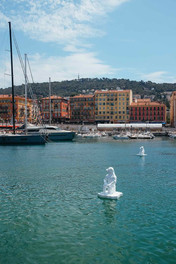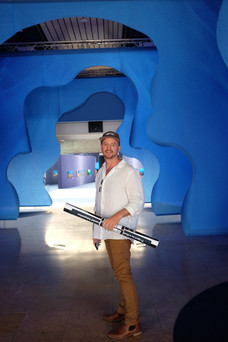ICM at the UN One Ocean Science Congress
- ICM News

- Jun 4, 2025
- 3 min read
Updated: Jun 26, 2025
International Coastal Management (ICM) is proud to be attending the United Nations One Ocean Science Congress (OOSC), which officially opened 3rd June in Nice. With over 2,000 scientists, experts, and stakeholders coming together to share research and shape the scientific foundation for global ocean policy ahead of the 2025 UN Ocean Conference.
A sense of urgency resonated throughout the opening ceremony, powerfully captured by the Mayor of Nice, Christian Estrosi, who declared:
“There is no Planet B. There is no Ocean we can switch in and out. I stand before you not as a scientist, but as someone who believes in science. The conclusions shared here are truths, not opinions.”
This sentiment echoed throughout the day. Speakers urged that scientific knowledge must not only be gathered - it must be mobilised. The Co-Chairs of the Congress and coordinators emphasised how far ocean science has come - from seafloor mapping to understanding tipping points - but that now is the moment to move from insight to impact.
Dr John Bell, the director of the European Commission’s ‘Health Planet’, emphasised the importance of bringing Small Island Developing Staes (SIDS) into the Atlantic community, and that,
“Science is here to build bridges, not walls. Europe is choosing science.”
Sessions and Insights
Throughout the One Ocean Science Congress, a powerful and consistent message has echoed: the health of the ocean is inseparable from the health of our planet and ourselves. The ocean generates 50% of the oxygen we breathe and absorbs 25% of global carbon emissions, playing a crucial role in climate regulation and sustaining life on Earth. More than 3 billion people rely on marine and coastal biodiversity for their livelihoods. Yet, marine ecosystems are under mounting threat, facing the risk of irreversible damage due to climate change, pollution, and unsustainable practices.
ICM attended the session: “Effectiveness, Equitability and Safety of Ocean-Based Approaches to Reach the Mitigation and Adaptation Goals of the Paris Climate Agreement.”
We heard presentations from a range of speakers, including Devi Veytia, who explored the evolving evidence base for “ocean-based solutions” in climate adaptation and Longhui Deng, who shared a new framework on how marine sediment microbes drive carbon transformation - an emerging area with significant implications for climate modelling.
Noosa Oyster Reef Restoration on Display at the Whale
In the afternoon, we visited La Baleine (‘The Whale’), a unique and immersive ocean science exhibition space open to the public. The Noosa Oyster Ecosystem Restoration Project Poster, which we worked on with the The Nature Conservancy, is featured here among 620 others scientific posters. Our Director, Aaron Salyer, will be at La Baleine each evening from 6-8pm, available to discuss the project, answer questions, and connect with anyone interested in nature-based solutions and coastal resilience.
ICM Presentation: A Framework for Coastal Resilience
In the afternoon OOSC session, Aaron Salyer presented ICM’s Coastal Resilience Framework, which emphasises three key intervention zones:
Top of Beach
Bottom of Beach
Sediment Supply
This holistic approach enables more robust, adaptable, and site-responsive designs. Aaron's talk generated a strong response during the panel discussion, where we shared lessons from our global projects, ranging from oyster reef restoration and salt marsh rehabilitation to island reinstatement and hybrid engineering solutions.
The Ocean Community
It was wonderful connecting in person with Dr Lucy Buxton and Jas Chambers from Ocean Decade Australia, and to exchange ideas with global peers from diverse fields. We had insightful conversations with Dr Elizabeth Macpherson from the University of Canterbury, who presented on the legal challenges and opportunities in developing frameworks for blue carbon governance, and Angelique Melet, who introduced the CoCliCo Project - an initiative supporting European and national authorities, city planners, and infrastructure owners in understanding and planning for large-scale coastal risks. These connections reinforce the sense that we are all contributing to a shared mission - driven by evidence, collaboration, and urgency.
With over 500 oral presentations, and a wide spectrum of global scientific voices, the UN One Ocean Science Congress is proving to be a large gathering of minds. We’re looking forward to Day 2 - more conversations, more collaboration, and more momentum toward ocean solutions.
Stay tuned as we continue to represent ICM and Australia’s coastal expertise on the global stage, and if you're here, get in touch with us!





























